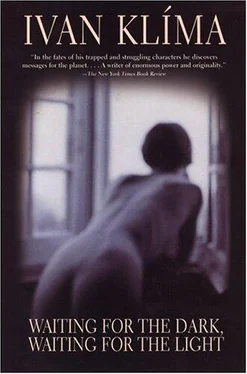He asked a man in a white gown what her name was.
'That's Albina,' the man replied.
'A strange name.'
'It suits her.'
How long had it been since she appeared in his life? And how often had he replayed that scene? It didn't matter. Perhaps it would put him to sleep. Autumn. Leaves drifting down on the gatehouse. He almost doesn't recognize her because she's no longer in white. The wind plays with her red skirt. Her wide lips seem sensuous.
'Excuse me, Miss Albina, do you have a moment?'
'How do you know my name? I don't know you.'
'This afternoon in the operating room — I was the one behind the camera.'
'What do you want?'
'Nothing, really.'
'Then don't bother me, I'm in a hurry.'
'Could I walk a little way with you?'
'Thanks, I'm fine by myself.'
'Would you mind if I met you here some day when you're not in a hurry?'
'I'm always in a hurry.'
Some conversations stick in the mind. The first is usually the most memorable, followed by the last. It tends to be the same with facial expressions. She attempted a severe look of rebuff, but it did not change the softness of her features. He watched her as she walked away. She seemed smaller than she really was, as though she had
withdrawn into herself. Perhaps it was the cold. Rain had begun to fall, and she was not wearing a coat.
Next day was the last day of filming in the hospital, but she was not on duty. The man who had revealed her name yesterday told him she would be working the night shift.
Next morning he waited for her at the entrance with a bouquet of roses.
Why? He didn't know. Probably out of wounded pride. He didn't like to admit that he'd been rejected.
'I can't accept flowers from you.'
'But I brought them for you.'
'Why?'
'To make you happy.'
'Why would you want me to be happy?'
'Because I find you attractive.'
'I don't like people who work in television.'
'That's discrimination,' he objected.
'I don't like people who work for our television,' she corrected herself. 'Because of what you do, because of the people you make programmes about. Like the surgeon— he's not a good man.'
'Why do you work for him?'
'Because I'm a nurse. I was working in the operating room before he came.'
'Couldn't you have left?'
She was silent for a moment. 'There's a difference. You probably can't feel it. But why should I explain it to you?' She gave a shrug and walked away. He took the flowers to his mother.
A week later he tried again. He left tickets for a concert at the gatehouse along with a card that said: I'd love you to come. But she didn't.
In a few weeks he would be forty-five. What had he actually accomplished? He'd made several short documentaries and a lot of story items that were instantly forgotten. He'd forgotten most of them himself. He had renovated a cottage acquired cheaply from someone who had recently gone into exile (life is full of paradoxes); he'd filled it with things that gave him no particular pleasure. He'd slept with a lot of women but he'd never fathered a child.
Eva was sound asleep, and most of the windows in the other blocks of flats were now dark. He got out of bed, put on his clothes, crept out of the room and left the flat with a feeling of relief.
The streets were like a graveyard. Graveyards remind us of the vanity of all human endeavour. He got into his red Fiat. At night he could drive fast; in half an hour he would be at his cottage.
What would he do there?
He could work on some of his scripts, on some of the screenplays he might one day manage to finish and film. He could give some thought to his future or examine his past.
The image was always the same: a disgusting office that reminded him of an interrogator's room. A personnel manager is leafing through some documents. Most probably they're Pavel's files: a collection of his deeds, his misdeeds, his crimes, fabricated from allegations, catchwords, denunciations and lies. Finally the man raises his bloodshot eyes with dark circles under them. 'So, you want to work in television?'
That had been seventeen years ago. At the time, he had nodded and thus made a decision to join the select few who took the places of those who'd just been fired. He was helping to replace those with whom, until that very moment, he had sympathized.
Yet it didn't feel like a real decision at all; he was simply accepting a job. The position was so menial and unimportant that he could see no reason to refuse. Still, he talked it over with his mother, and with Peter and Alice. His mother thought he should take it. Peter said that he personally would never cross the threshold of that factory of lies. Alice disagreed: she said it depended on what he did there and how he behaved. Everyone had the right to work at what he knows how to do and what he wants to do, even if others have been denied that right. The conditions in which we all live, she said, were not his fault, and he had even tried to escape from them, but it hadn't worked out and as a result his life had been made very difficult for a long time. Alice understood him.
He began work as an assistant cameraman. He dragged
cables around and set up lights as he was directed.
But of course it had been a real decision after all. He believed he would be promoted and eventually make his own programmes, his own films.
He was diligent and patient. He knew that in the end they would let him do what he wanted, and they did, though he had to wait several years.
Fate was on his side. Two young men hijacked a school bus and demanded to be allowed to cross the border. In the twenty years since he had tried to escape, the world had grown used to more extreme methods of breaking through the limits of what was permitted.
The border guards promised the hijackers that they would get what they wanted if they let the children go. The hijackers agreed but, once the children had been released, the border guards reneged. They blocked the bus's passage and opened fire, killing one of the hijackers and the driver.
Pavel discovered that an old classmate of his was one of the guards involved. This prompted him to propose a documentary about the event. His producer granted permission, and his former classmate agreed to meet him — even promising to take him fishing in the border zone.
Almost as soon as he arrived, his classmate gave him fishing tackle and a pair of waders, and they walked along a line of warning signs and through a zone of barbed-wire barriers until they reached a stream that formed the border. Almost twenty years had gone by since his escape attempt, yet every step he took made him tremble.
The stream meandered through a shallow wooded valley, and from this vantage point the wire was invisible. His classmate, who by now had reached the rank of major, stood on a flat stone, threw in his line and, as though they had really got together just to go fishing, began to tell him how hard it was to catch the wily grayling.
Pavel also threw his line in the water but instead of keeping his eye on the float, he looked across the border. For the first time in his life, another country lay within reach, but he no longer yearned to go there and felt merely a sense of curiosity, wondering if a spy, a lost tourist or a border guard might suddenly appear from the
other side to find him wading in this stream with the border running down the middle of it.
The major climbed down off the rock and walked downstream. 'Be careful, Pavel,' he said. 'Don't stumble on to the other side. You never know who might be hidden over there behind those fir-trees.'
He nodded. He understood that his uniformed classmate might get into trouble even if he didn't step over the imaginary line. He had brought him here knowing full well that years ago, when Pavel had tried to reach the other side, he'd been caught by body-snatchers wearing the same uniform the major was wearing now. But that was long ago, and now everything had changed. Pavel was here to make a film about him and his heroism. He hoped that when his superiors saw the film on television, they would promote him.
Читать дальше











